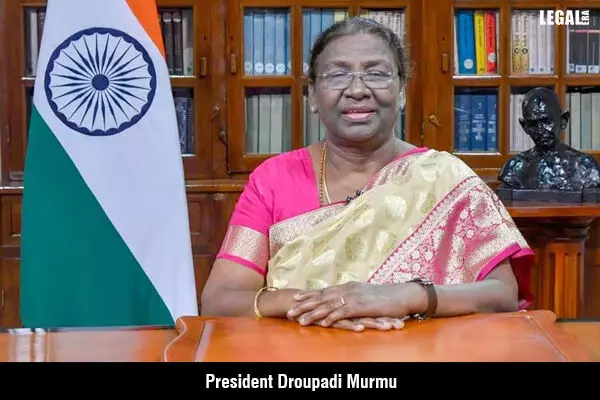- Home
- News
- Articles+
- Aerospace
- Artificial Intelligence
- Agriculture
- Alternate Dispute Resolution
- Arbitration & Mediation
- Banking and Finance
- Bankruptcy
- Book Review
- Bribery & Corruption
- Commercial Litigation
- Competition Law
- Conference Reports
- Consumer Products
- Contract
- Corporate Governance
- Corporate Law
- Covid-19
- Cryptocurrency
- Cybersecurity
- Data Protection
- Defence
- Digital Economy
- E-commerce
- Employment Law
- Energy and Natural Resources
- Entertainment and Sports Law
- Environmental Law
- Environmental, Social, and Governance
- Foreign Direct Investment
- Food and Beverage
- Gaming
- Health Care
- IBC Diaries
- In Focus
- Inclusion & Diversity
- Insurance Law
- Intellectual Property
- International Law
- IP & Tech Era
- Know the Law
- Labour Laws
- Law & Policy and Regulation
- Litigation
- Litigation Funding
- Manufacturing
- Mergers & Acquisitions
- NFTs
- Privacy
- Private Equity
- Project Finance
- Real Estate
- Risk and Compliance
- Student Corner
- Take On Board
- Tax
- Technology Media and Telecom
- Tributes
- Viewpoint
- Zoom In
- Law Firms
- In-House
- Rankings
- E-Magazine
- Legal Era TV
- Events
- Middle East
- Africa
- News
- Articles
- Aerospace
- Artificial Intelligence
- Agriculture
- Alternate Dispute Resolution
- Arbitration & Mediation
- Banking and Finance
- Bankruptcy
- Book Review
- Bribery & Corruption
- Commercial Litigation
- Competition Law
- Conference Reports
- Consumer Products
- Contract
- Corporate Governance
- Corporate Law
- Covid-19
- Cryptocurrency
- Cybersecurity
- Data Protection
- Defence
- Digital Economy
- E-commerce
- Employment Law
- Energy and Natural Resources
- Entertainment and Sports Law
- Environmental Law
- Environmental, Social, and Governance
- Foreign Direct Investment
- Food and Beverage
- Gaming
- Health Care
- IBC Diaries
- In Focus
- Inclusion & Diversity
- Insurance Law
- Intellectual Property
- International Law
- IP & Tech Era
- Know the Law
- Labour Laws
- Law & Policy and Regulation
- Litigation
- Litigation Funding
- Manufacturing
- Mergers & Acquisitions
- NFTs
- Privacy
- Private Equity
- Project Finance
- Real Estate
- Risk and Compliance
- Student Corner
- Take On Board
- Tax
- Technology Media and Telecom
- Tributes
- Viewpoint
- Zoom In
- Law Firms
- In-House
- Rankings
- E-Magazine
- Legal Era TV
- Events
- Middle East
- Africa
Waqf Bill Gets President Droupadi Murmu’s Assent; Becomes Act

Waqf Bill Gets President Droupadi Murmu’s Assent; Becomes Act
lt was recently cleared by the Parliament after intense and lengthy debates in the Lok Sabha and the Rajya Sabha
President Droupadi Murmu has given the nod to the Waqf (Amendment) Bill, 2025, as announced by the Ministry of Law and Justice in a 5 April notification.
The landmark legislation triggered a debate, with its constitutionality being challenged in the Supreme Court by the All India Majlis-e-Ittehadul Muslimeen (AIMIM) chief Asaduddin Owaisi and Congress Parliamentarian Mohammad Javed.
However, the government was resolute in refuting the allegations that the amended law encroached upon the religious practices of Muslims.
In a decisive intervention during the Lok Sabha proceedings, Home Minister Amit Shah clarified the essence of the legislation. He emphasized that Waqf, a sacred charitable endowment, and the waqif, or donor, were inherently rooted in the Muslim community.
The minister stressed that the inclusion of non-Muslims in Waqf Boards or Councils was solely for administrative purposes, ensuring that every waqf donation was utilized for its “intended noble” cause.
While dispelling fears and addressing concerns, Shah stated, "There is a deliberate attempt to sow confusion, suggesting that this law encroaches upon religious practices or alters the sanctity of donations."
He added that such baseless fear-mongering, was a "calculated ploy" to manipulate public sentiment and "create a vote bank."
Distinguishing between the spiritual sanctity of Waqf and the administrative nature of Waqf Boards, the home minister asserted that "Waqf, as a charitable endowment," remained a religious institution. However, Waqf Boards and Councils were administrative entities, "devoid of religious connotations."
The legislation underscored the government's resolve to uphold constitutional principles while ensuring transparency and accountability in the administration of charitable endowments. It marked a pivotal moment in the nation's legislative journey, reflecting a delicate balance between tradition and modern governance, Shah maintained.
After a lengthy and intense discussion in the Upper House (Rajya Sabha), the Bill won by a majority of 128 votes against 95. Earlier, it was passed in the Lower House (Lok Sabha) following a marathon debate of over 12 hours.
The Home Minister and Parliamentary Affairs Minister Kiren Rijiju had made a strong case for the Bill in the Lok Sabha, whereas slamming the Opposition, Leader of Rajya Sabha and Union Minister JP Nadda, led the debate in the Rajya Sabha.
Nadda blasted the Congress for its handling of the Waqf Act, accusing the grand old party of enacting the law in a way that allegedly facilitated land mafias. He defended the proposed amendments, emphasizing the urgent need for reforms to protect national interests and prevent the misuse of Waqf properties.
Nadda underlined that the entire purpose was to serve the poor from the Muslim community. He drew attention to the formation of a Joint Parliamentary Committee (JPC) under the Prime Minister Narendra Modi-led government.
Comprising 31 members, the committee facilitated over 200 hours of debate on the bill. The Union Minister pointed out that it was in stark contrast to the JPC setup during the United Progressive Alliance (UPA) government in 2013, which had only 13 members and lacked the same level of commitment.
Furthermore, Nadda asserted that democracy thrived on meaningful discourse and inclusion of diverse perspectives rather than the acceptance of a single viewpoint.



